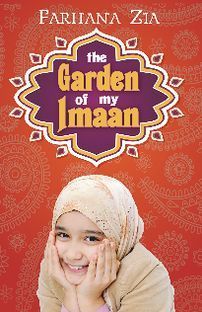Description: Aliya already struggles with trying to fit in, feeling confident enough to talk to the cute boy or stand up to mean kids—the fact that she's Muslim is just another thing to deal with. When Marwa, a Moroccan girl who shares her faith if not her culture, comes to Aliya's school, Aliya wonders even more about who she is, what she believes, and where she fits in. Should she fast for Ramadan? Should she wear the hijab? She's old enough for both, but does she really want to call attention to herself?
Review: The Garden of My Imaan reminded me very much of Judy Blume's classic Are You There God? It's Me, Margaret, but with an Islamic twist. Aliya is an Indian-American, Muslim tween who struggling with her own imaan, an Arabic word for faith, her religious identity, and dealing with Islamophobia. With Ramadan fast approaching, Sister Khan asks Aliya's religion class to set Ramadan goals and write about what they learn. Like Margaret before her, Aliya pours out her worries from fretting over puberty, an unrequited crush at school, and the introduction to Marwa, a new girl at school who is from Morocco and wears the hijab. Asked to befriend Marwa at school, stirs up mixed emotions in Aliya. She is first annoyed and then intrigued at how Marwa finds a place for herself without sacrificing her religious principles. Marwa is a quiet leader who stands up for herself with educating others around her instead of insulting them. She is clearly a role model for Aliya, however, I would have loved if the author created her as a three dimensional character instead of a perfect girl. We don't see Marwa develop except at school and I wanted to know more about her.
To be completely honest, I was afraid to read this book because the synopsis and the cover made me believe that the author has a certain bias, but I am so glad that I was wrong. The author makes clear of Islamophobic acts that Muslims face, from being called names and be told to go "back to your country", but she also includes the dangers of girl's being attacked by someone who rips their hijab off. The downside of open observance is clear to readers, but she also enlightens others about the beliefs and intentions underlying these religious observances, especially hijab. The hijab is worn proudly by Marwa and she doesn't feel weird about it. It is how she expresses her faith. For Aliya's mother, who doesn't wear it, "hijab is a symbol of modesty--a good symbol but a figurative one." Aliya's mother demonstrates modesty by the clothes that she wears. Zia points out that there is more than one way Muslims observe their religion and one is not more acceptable or right than the other. Don't be afraid to pick up this book, it is a refreshing story that will serve as mirrors to Muslim readers and a window to others who want to know more about Islam without any heavy handedness.
Rating: 4 stars
Words of Caution: None. Recommended for Grades 4 and up.
If you like this book try: Amina's Voice by Hena Khan













This one sounds good; I am glad there are more books about Islamaphobia, the hijab, etc being published for teens.